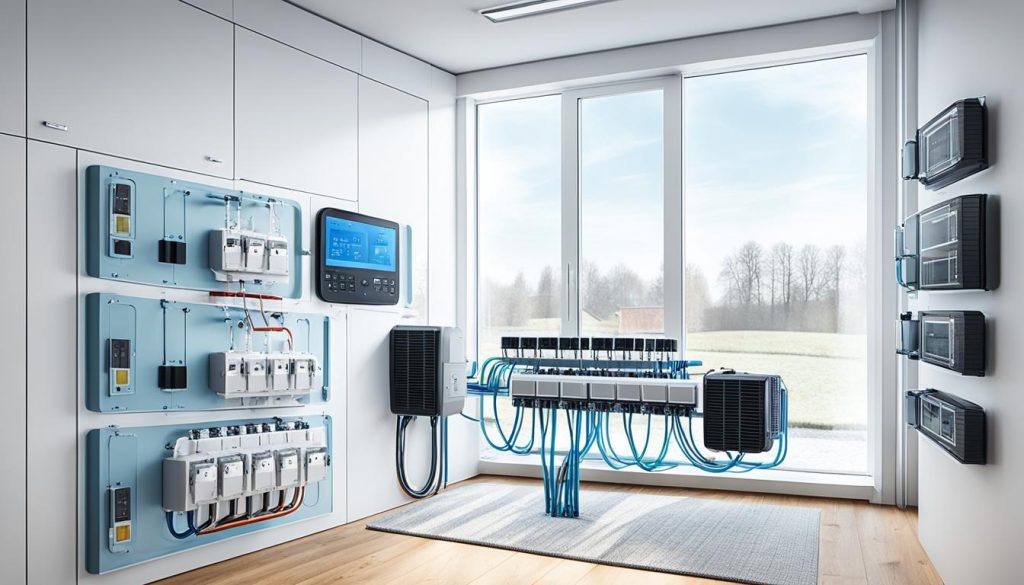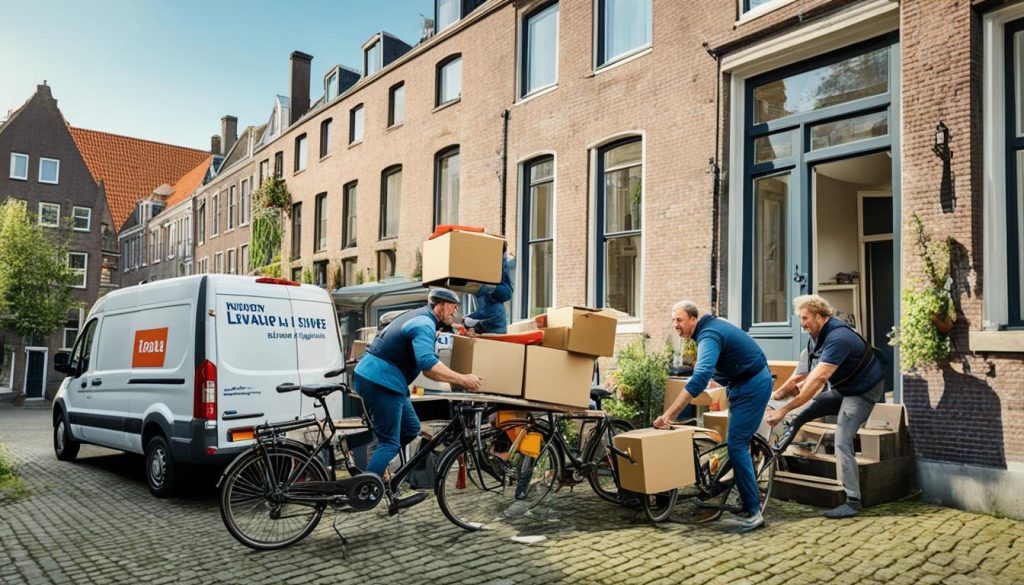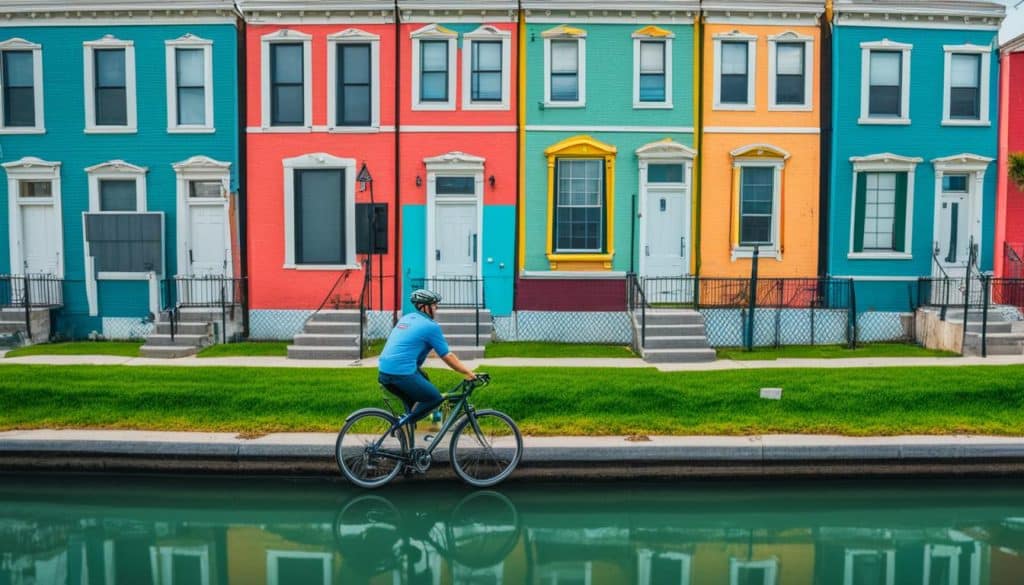The Netherlands is a magnet for UK expats, offering diverse housing in its unique market. If you’re looking to rent or buy, it’s key to grasp the local real estate ways. This makes moving smoother.
About 42% of homes are for rent, and there’s a looming shortage of 300,000 homes. Knowing how to handle the renting and buying process is vital. Renting involves rights and duties, like paying rent, deposit, and sometimes agency fees. Buying demands pondering over mortgages and extra costs.
The Dutch housing policy is overseen by the Ministry of the Interior and Kingdom Relations. This ensures access to different lodgings, including houses, flats, and houseboats. This guide aims to enlighten UK expats on making wise decisions in the Dutch housing scene.
Key Takeaways
- The Netherlands has many options for UK expats wanting to rent or buy.
- Renters need to know about rent, deposits, and other duties.
- When buying, it’s good to think about mortgages and extra expenses.
- The Ministry of the Interior and Kingdom Relations watches over housing rules.
- There’s a variety of homes, from detached houses to houseboats.
Overview of Renting in the Netherlands
Renting is quite popular in the Netherlands, with many homes available for rent. This bustling Dutch rental market has a wide range of properties. It caters well to both locals and expats.
A large number of rental units belong to housing associations, about 75%. These organisations are crucial in offering social housing to those who qualify. They aim to keep rents low for these homes.
Expats need to know their rights and how to rent in the Netherlands. Getting social housing can be tough due to high demand. The private rental sector might be pricier but has many choices.
Knowing the differences between private and social housing is essential. It makes finding a place easier. Being prepared and informed helps greatly in this structured market.
Popular Cities to Rent in the Netherlands
The Netherlands has lots of rental options, suited to different tastes and needs. You can find something in a busy city or a lively student area. Each place has its unique charm.
Amsterdam
Amsterdam is famous for its beautiful canals and rich history. It’s a favourite among those looking at Amsterdam rentals. The city is great for jobs in tech and creative fields. Yet, high demand makes the rents quite steep.
Rotterdam
Rotterdam is known for its contemporary buildings and large port. It’s home to global companies. The variety of Rotterdam apartments caters to all, from posh penthouses to budget-friendly flats. It’s ideal for people in logistics, maritime, and finance.
The Hague
The Hague is where many international groups and embassies are based. Its housing suits expats and the elite, offering luxury. Thanks to its coastal location and culture, it’s sought after but pricey.
Groningen
As a vibrant student town, Groningen has a lot of student homes needed. With many students there, the places to live are made for young adults. They’re affordable and near schools.
Types of Rental Properties Available

The Dutch rental market has many options for everyone. You can find large detached houses and small apartments. There are also terraced houses and houseboats for those looking for something different.
Detached Houses
Detached houses in the Netherlands are perfect for families wanting peace. They come with gardens and lots of space. Found in quieter, suburban areas, they mix modern comforts with beautiful views.
Semi-Detached Houses
Semi-detached homes offer both privacy and a sense of community. They share one wall with a neighbor. This makes them less expensive than detached homes yet still private.
Terraced Houses/Townhouses
Terraced houses, or townhouses, share walls with neighbours on both sides. Sitting in a row, they fit well in city settings. Their smart design effectively uses every inch of space.
Apartments
Apartments in the Netherlands cater to both young professionals and small families. From small studios to large, multi-room flats, they offer modern living in the city’s heart. This makes them very popular.
Houseboats
Houseboats offer a special home right on the water. They’re cosy, offbeat, and perfect for those wanting to live differently. Found mainly in Amsterdam, they provide peaceful living in busy cities.
Finding Rental Properties in the Netherlands
The search for a rental in the Netherlands involves several methods. People often use online sites, estate agents, and newspaper ads.
Online Portals
Online platforms have changed how tenants look for rentals in the Netherlands. Sites like Homelike and HousingAnywhere have a lot of listings. They show photos, full details, and sometimes virtual tours.
Letting Agents
Working with estate agents can also help find rentals. They give personalised help, making the search easier. Make sure they’re part of the NVM for trustworthiness. However, remember that agents usually charge a fee.
Local Newspapers
In smaller areas, newspapers are still useful for finding rentals. They have classified ads with listings not always found online. This way can lead to finding special rental properties.
Student Housing in the Netherlands
Finding a place to live in the Netherlands can be interesting, especially for students from other countries. Knowing what housing is available helps make starting university life happier.
University Accommodation
Several universities in the Netherlands offer housing right on campus. They work with groups like SSH and DUWO to do this. Living on campus is very popular with students coming from abroad.
Campus homes make getting to university places easier. They also help students find friends in a new place. But, these homes are limited and everyone wants one, so apply early.
Private Student Housing
Students can also look for their own place to live. This lets them choose how they want to live. In cities like Groningen, where lots of students live, there are many homes to rent.
These rentals can be anything from a flat shared with others to a single room. They usually offer more freedom and privacy than campus housing.
The internet is a great place to look for these homes. Many websites list places just for students. Housing groups that focus on student homes can also help find good places to live.
Flatsharing Options in the Netherlands

Flatsharing in the Netherlands is a budget-friendly choice for newcomers. It’s especially true in big cities like Amsterdam and Rotterdam. Here, room rentals are quite popular among expats and students.
Many go for informal rental agreements with their flatmates. However, getting a written agreement is key. This is vital when a deposit is involved. It helps prevent sudden evictions and disputes.
When looking for flatsharing in the Netherlands, consider the location, your budget, and what you want in flatmates. Shared living lets you cut down on costs and enjoy being with others.
To wrap up, flatsharing helps new arrivals save money. Always ensure you have a written lease. This protects your tenant rights and makes flatsharing smoother.
The Costs of Renting in the Netherlands
It’s very important to know about all the costs when you rent in the Netherlands. These include the monthly rent, the first deposit, and fees if you use a letting agency. Let’s look at these costs one by one.
Monthly Rent
The biggest cost is usually the monthly rent. Prices can change a lot depending on where the property is, how big it is, and what type it is. For example, living in Amsterdam is often more expensive than in smaller cities like Groningen. It’s a good idea to look up average rents in the area you’re interested in.
Rental Deposit
Most renters need to pay a deposit when they move in. This deposit is usually the same as one to three months’ rent. It’s there to protect the landlord in case of damage or if rent isn’t paid. Make sure you understand the deposit rules before you agree to anything.
Agency/Administration Fees
If you find your place through a letting agency, you might have to pay extra fees. These agency fees pay for the service they provide and can be quite high. Always ask about these fees before you decide so there are no surprises later.
Knowing about these costs helps renters make smart choices. This way, you can find the best option for your budget and what you need.
Tenant and Landlord Rights in the Netherlands
In the Netherlands, knowing the rights and duties of tenants and landlords is key. It helps keep a good relationship in rentals. Dutch laws protect tenants, making sure they’re treated right and know their rights. Landlords have clear responsibilities too, for a fair balance.
The tenancy agreement is important, as it lists duties and rules under Dutch laws. It covers how long you rent, the cost, and who fixes what. Making everything clear from the start avoids problems later.
If there’s a disagreement, the Rent Tribunal (Huurcommissie) can help. This group steps in to solve issues like wrong rent charges, upkeep problems, and more. They are fair to both sides, fixing issues without bias.
Looking after a rental is a joint effort. Mostly, landlords take care of big repairs and basic utilities. Tenants look after small fixes and everyday care. A good contract makes who does what clear, stopping fights before they start.
- Ensure tenancy contract clarity to protect Dutch tenant rights
- Adhere to landlord obligations for a balanced rental relationship
- Utilise the Rent Tribunal for dispute resolution
Utilities and Telecommunications for Renters

Understanding the Dutch utilities setup is key when renting in the Netherlands. Most people renting there need to handle their utility services. But, some costs might already be covered in your rent.
Choosing an energy provider offers flexibility to tenants. This allows them to look for the best deals. It’s also important for renters to think about the costs of electricity, gas, and water when planning their budget.
Telecommunications is another crucial part of renting in the Netherlands. The country has a top-notch telecommunications network. Renters can pick from different providers for internet, TV, and phone services. It’s smart to compare options to match your budget and needs.
Usually, waste collection fees are included in the rent. Still, it’s wise to double-check with your landlord or agent when you agree on the lease. Managing utilities well can help make renting smoother and save money over time.
Exploring the Buying Process in the Netherlands
Buying property in the Netherlands is a smart choice. But, it’s important to get how it all works. This includes getting a mortgage and handling extra costs. It’s a good idea to talk to a mortgage adviser Netherlands to get through the complex parts of buying a Dutch property.
Mortgage Options
Looking into mortgage types is key when buying property in the Netherlands. You can choose from fixed-rate or variable-rate mortgages. A mortgage adviser Netherlands can help pick what’s best for you. Banks also offer special mortgages for expats, so expert advice is vital.
Additional Costs
There’s more to pay for than just the mortgage. This includes transfer taxes, notary fees, and valuation fees. Some costs might not apply if you’re buying for the first time. You must use a notary in the Netherlands for the deal to be official. Online tools and estate agents can also help you understand these costs.
- Transfer Taxes: Usually, it’s 2% of what you pay for the property.
- Notary Fees: These fees depend on the notary. They are typically between €1,000 and €3,000.
- Valuation Fees: You need this for the mortgage. It’s usually about €500.
Knowing about home buying costs makes buying property easier and less surprising. A mortgage adviser Netherlands can help a lot. They ensure you get the best out of your investment.
How to Find Properties to Buy
Looking for property listings in the Netherlands can be a bit tricky, but you can manage it well with the right approach. Using the internet and talking to real estate agents will really help. They can send you updates about new properties and suggest the best areas based on your preferences. Let’s check out how to find your next home.
Online Listings
Many websites, like the famous Funda, show property listings for the Netherlands. These sites are great for homebuyers, offering ways to tailor your search. By setting up alerts, you won’t miss any new homes that come on the market.
Estate Agents
Talking to local real estate agents will give you expert advice on the Dutch property market. They know all about certain areas and the latest market trends. They can also help you negotiate prices and understand Dutch property laws, making buying a home much easier.
Viewing and Making an Offer on a Property
Seeing a property viewing in the Netherlands is key when buying a home. It lets you feel the area, check the property, and ask questions. You often book these viewings with an estate agent for the seller.
For a better look, plan to visit the property several times at different times. This ensures you know exactly what you’re considering.
After finding your ideal home, you should then make an offer on Dutch property. It’s smart to use a buying estate agent to help. This can increase the chance of your offer being accepted. Always include a clause in your offer that makes it depend on getting the needed funds.
This means your offer only goes through if you secure the money. It could be through getting a mortgage or other financial ways.
- Arrange viewings with an estate agent.
- Conduct multiple viewings to get a comprehensive understanding.
- Work with a purchasing estate agent to submit your offer.
- Include a finance approval clause in your offer.
Knowing these steps helps make buying homes in the Netherlands easier. Being ready and informed helps you succeed. This way, you can find the perfect home in the Dutch area you love.
The Renting and Buying Processes in the Netherlands
Understanding how to rent or buy in the Netherlands is key. This is true for expats and locals alike. Knowing the steps helps everyone.
When you want to rent, start by looking online, through agents, or newspapers. After finding a place, you view it. Then, make an offer and sign the contract, knowing your rights and duties.
After signing the rental contract, set up your utilities and internet. It is also smart to learn about the rules for tenants and landlords. This makes renting smoother.
For buyers, the journey begins with searching online or via estate agents. Then, you view homes and make an offer. It’s important to know that buying a house involves many steps. You might need a mortgage and have to pay for valuations and notary fees. All the legal boxes must be ticked.
When you reach an agreement, you sign a preliminary contract. Then, the notary finalises the ownership transfer. Knowing these steps is crucial for buying in the Netherlands.
Preparation is key in navigating Dutch property markets. Whether you’re renting or buying, knowing what to expect makes everything easier. Your move to a new home in the Netherlands will be much smoother.
Legal Steps in Buying Property
Buying property in the Netherlands involves several key legal steps. It’s important to follow them for a lawful purchase. This includes starting with a preliminary agreement to understanding Dutch notary needs. Everyone buying property must know and follow these steps carefully.
Preliminary Contract
Signing a preliminary agreement, or koopovereenkomst, is one of the first steps. This document shows the deal terms and the buyer’s intent to buy. The buyer gets a three-day cooling-off period. During this time, they can cancel without penalty.
Notary Services
Notaries play a big role in transferring property. They handle the final deed and register the property. A Dutch notary drafts and signs the transfer deed. They also manage the mortgage deed, if needed.
First-time buyers could get fees waived. Also, mortgage-related notary fees might be tax-deductible.
Moving In: What to Expect in the Netherlands

Moving in the Netherlands offers a unique challenge due to its architecture. Most houses have narrow stairs. So, many items are moved through windows with a specialised lift. It’s usual to see furniture going up to the second or third floor this way. This method ensures safe relocation of bulky items.
Expats can choose professional removal services Netherlands provides. These services can handle all Dutch moving day quirks. They offer everything from packing to lifting equipment for window moves. Many expats find this much easier than moving by themselves.
If you prefer doing things yourself, you could gather friends and rent moving equipment. You can pick either professional removal services Netherlands offers or a DIY move. But, planning ahead is vital.
On the day of the move, talk to your neighbours about your plans. Make sure parking for the moving van is arranged ahead. A smooth move also means making sure your new home’s utilities are up and running.
Getting used to a new country poses challenges for expat relocation. But, with the right preparation and knowledge of local ways, moving day can go without a hitch. This will help you start your new life in the Netherlands easily.
- Consider professional removal services Netherlands.
- Prepare for moving items through windows using specialised lifts.
- Coordinate moving logistics with neighbours.
- Ensure utilities are transferred and operational.
Social Housing in the Netherlands
Social housing is a big part of the rental market in the Netherlands. It provides homes at controlled rents, making living affordable for those with lower incomes. To be eligible, one must meet criteria based on income, local connections, and specific requirements by the municipalities. This makes sure that affordable homes go to those who really need them.
Getting into Dutch social housing can be tough, especially for expats. Though it’s hard for non-Dutch people to qualify, those who do can save a lot on rent. However, they must be ready to wait a long time on the list because of strict rules on income and where you live.
There’s not enough social housing, leading to long wait times, sometimes years. It’s important for those eligible to apply early and look for other options while waiting. Knowing how the Dutch social housing works is key to making the most of it. Despite the rules, social housing is crucial for making sure many can afford to live in the Netherlands.













